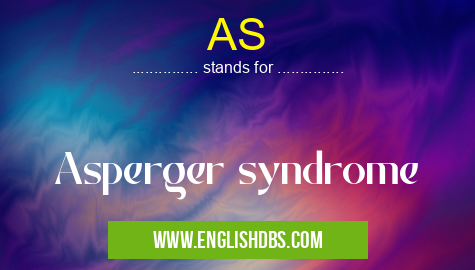What does AS mean in NURSING
The abbreviation AS stands for Asperger Syndrome. It is a form of autism spectrum disorder (ASD) that is less severe than some other forms and is characterized by difficulties in social interactions, non-verbal communication, and restricted or repetitive patterns of behavior and interests. Asperger Syndrome typically affects those on the higher-functioning end of the autism spectrum, meaning those who may have difficulty with communications but are still able to live independently without aid. Though Asperger Syndrome cannot be cured, interventions such as Applied Behavior Analysis (ABA) can help those with the syndrome manage their symptoms and live healthy lives.

AS meaning in Nursing in Medical
AS mostly used in an acronym Nursing in Category Medical that means Asperger syndrome
Shorthand: AS,
Full Form: Asperger syndrome
For more information of "Asperger syndrome", see the section below.
What Does AS Mean?
Asperger Syndrome is identified by distinct characteristics such as impairments in social interactions, restrictive or repetitive behaviors, and difficulties with non-verbal communication. Those diagnosed with Asperger Syndrome often struggle to understand nuances in conversation and use appropriate body language when communicating. They may also engage in seemingly strange or repetitive activities, have difficulty initiating conversations, or talk excessively about topics that interest them but not others. In addition to struggles with communicating socially, many people with Asperger Syndrome have hyper-focused interests which they may intensely focus on to the exclusion of other activities. This can lead to difficulty transitioning from one activity to another or be overly critical when discussing topics related to their special interest areas. People afflicted with Asperger syndrome may also have difficulty interpreting and responding appropriately to subtle emotions like sarcasm or irony due to an inability to recognize facial expressions or gestures associated with emotions which are commonly communicated nonverbally through these means.
Treatment Options
Though Asperger Syndrome is generally considered a lifelong condition that cannot be cured, it can be successfully managed through lifestyle modifications such as social skills training and ABA therapy. ABA therapy involves teaching individuals new skills gradually through positive reinforcement methods while also helping them better recognize cues from others and respond accordingly in order to improve social interactions. Social skills training can help a person build up their confidence while learning how to interact more effectively with others in different settings both socially and professionally. Other treatments such as occupational therapy can focus on organizational skills and further assist individuals afflicted by Asperger's by giving them strategies they need for living more independent lives whether it be managing finances, self-care tasks, or daily routines.
Essential Questions and Answers on Asperger syndrome in "MEDICAL»NURSING"
What is Asperger syndrome?
Asperger syndrome (also known as Asperger’s Syndrome, Asperger’s Disorder) is a type of Autism Spectrum Disorder (ASD). It is characterized by difficulties with social interaction and communication, and by restricted, repetitive, or stereotyped behavior.
What are the symptoms of Asperger syndrome?
Common symptoms include difficulty in maintaining conversations, trouble understanding nonverbal behavior such as body language and facial expressions, sensitivity to noise and other sensory stimuli, strong adherence to routines and obsessive interests in certain topics.
How is Asperger Syndrome diagnosed?
Diagnosis is typically based on clinical observation of an individual's behavior over a period of time. It may also involve psychological testing or neurological imaging. A diagnosis can help individuals access services they need for successful living.
Who may be affected by Asperger syndrome?
People from all backgrounds can be affected by the condition. While there is no definitive way to identify who may be affected with the disorder, there are signs that may suggest someone has it which can help guide diagnosis.
Is there any treatment available for Asperger syndrome?
Although there is no single approach or treatment for people with Asperger Syndrome, some interventions have been developed that can help manage various aspects of the condition including anxiety, depression, communication difficulties and motor skills problems.
Can adults have Asperger Syndrome?
Yes – many people remain undiagnosed until adulthood when they may start to notice difficulties in their daily life activities. This could involve challenges at work due to social awkwardness or difficulty in forming relationships with colleagues or peers.
What benefits are offered to those with Asperger Syndrome?
Depending on the severity of the condition and where you live different types of benefits may be available including disability benefits provided through the government; emotional support programs such as counseling; education support; vocational training and job placement services; housing subsidies; respite care; medical equipment coverage; access to recreational activities; legal aid support.
Is there a cure for Asperger Syndrome?
At present there is no known cure for this complex condition but early diagnosis and intervention can greatly improve outcomes for individuals on the autism spectrum over time. Instead of cure-based approaches professionals now focus on developing strategies to effectively manage symptoms and enhance quality of life.
What do I need to do if I suspect someone has Asperger Syndrome?
If you think a friend or family member might have this condition it’s best first to speak with them about your concerns - ask questions sensitively yet openly so that you don't come across as judgmental but understanding. Next reach out for professional help from GP's or Autism specialists trained in psychological evaluation techniques.
Final Words:
AS stands for Asperger Syndrome which is recognized as an autism spectrum disorder (ASD). Individuals diagnosed with this disorder typically struggle with conversations due to impaired social skills including difficulties recognizing facial expressions related emotions as well as hyperfocused interests combined with restricted patterns of behavior which make transitions between activities difficult for them. Thankfully though interventions such as ABA therapy and social skills training can help those suffering from this disorder manage their symptoms so they can lead healthier lives without needing assistance from external sources.
AS also stands for: |
|
| All stands for AS |
